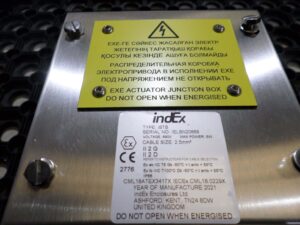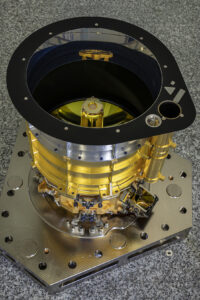Sixty digital leaders now have the vision and the skills to pursue smarter manufacturing through Made Smarter’s innovative Leadership Programme.
Five cohorts of managers and directors at SME manufacturing companies have now completed the Made Smarter Leadership Programme through the Lancaster University Management School (LUMS), the University of Liverpool (UoL) and Manchester Metropolitan University (MMU).
The programme encourages current and future leaders to develop a new way of looking at their business and create a clear strategy to enable the adoption of digital technology, including how that can drive the net zero agenda.
It uses a blend of workshops delivered by academics and experts in digital and leadership, site visits to SME manufacturers who are already on the journey of adopting digital technology, facilitated-learning sessions, and special project ‘sprints’ to test new ideas.
The programme also uses peer-to-peer coaching to create a trusted network of leaders, many of whom have remained in close contact.
Among the trailblazing businesses to embark on the programme are: Optimold (Warrington), Technoprint (Winsford), Abbey England (Knutsford), Actikem (Warrington), Twinfix (Warrington), Eden River Brew Company (Penrith), Astec Precision (Ulverston), Cumbria Clock Company (Penrith), Forth Engineering (Barrow), Primasonics (Penrith), Createc (Cockermouth), Arden Dies (Stockport), Eurofabs (UK) Ltd (Rochdale), DRM Industrial Fabrics (Bury), Fintek (Ramsbottom), Heatsense Cables (Rochdale), Len Wright Salads (Tarleton), Arc Lancaster (Lancaster), Connect 2 Cleanrooms (Lancaster), Daedalian Glass (Poulton-le-Fylde), Fleetwood Sheet Metal (Fleetwood), Seward Precision Laser (Preston), Pendle Doors (Darwen), Inscape Interiors (Chorley), Forsberg Services (Lancaster), Norcott Technologies (Widnes), D T & G Ltd (Bromborough), DT Engineering (Widnes), Flexitallic (Ellesmere Port), Gencoa (Liverpool) and Milexa (Liverpool).
With 60 SME leaders now empowered to transform their businesses, manufacturers across the North West are now being encouraged to register their interest for the next two cohort intakes, starting on October 7 and November 10 at Lancaster University.
Reflecting on the success of the programme, Donna Edwards, Director of the Made Smarter Adoption Programme in the North West, said: “I am delighted that the Leadership Programme has helped create 60 new digital leaders by giving them time out of their business to reflect on the bigger picture and share ideas and experiences alongside their peers in manufacturing, and then return to their own business and develop a digital strategy to create growth and efficiencies.
“They are among hundreds of manufacturers in the region grasping the opportunities offered by Made Smarter which include expert, impartial technology advice, digital transformation workshops to help take that first step to transform a business, funded digital technology internships, and support with technology adoption projects.
“I would encourage SME manufacturers to make contact with Made Smarter to find out how we can help with leadership development, skills, and how to adopt technology the right way.”
The programme, which takes place over eight months, includes seven workshops led by both academics delivering leading edge thinking and business practitioners demonstrating adoption in real business settings.
Delegates will also embark on ‘sprints’ where they will test their ideas with other business leaders to build engagement and learn from each other.
Andrea Williams, Operations Director at Norcott Technologies, an electronics manufacturer, based in Widnes, described the sprint sessions as her ‘lightbulb moment’.
“Theory is valuable and arms you with ideas, concepts and tools you can use,” she said. “Each element of the programme was an important piece in the jigsaw, and every session I returned to work energised with new ideas, purpose and strategy. But hearing how it had been successfully applied to another business and seeing the proof was the breakthrough moment. That was when I saw the full picture. Everything then fell into place.
“While much of my focus is navigating the impact of Covid, the programme has given me confidence that I am moving in the right direction.”
Virtual site visits to SME manufacturers already driving digital in their companies included Runcorn-based Hosokawa Micron Ltd, a manufacturer and supplier of powder processing systems and equipment which has transformed its production performance through the application of digital technologies, and Veka Plc, a Burnley-based manufacturer of PVCu window systems.
Peter Addison, Business Systems Manager at Connect2CleanRooms, a manufacturer of in critical environments, based in Lancaster, was inspired by the insights.
“The Hosokawa journey was an enlightening presentation and allowed me to consolidate my thinking,” he said. “Although the business is different to ours, their digital challenges were the same.
“It has helped me to consider the role of digitalisation in our business and how this will connect back to things like staff development, wellbeing, our brand and the benefits pursuing and prioritising our digital strategy.”
Peter also benefited from the Learning Forums.
“My initial thought of having to be part of a group discussing business issues was not something I particularly looked forward to doing. However, six months on they have been so useful and a great opportunity to connect and learn from others. Even after the programme ended, we still meet up weekly, and throw into the discussion issues we are facing and you can always be assured of honest, unbiased, constructive feedback. It has been brilliant.”
Sarah Poynter, Operations Manager at Arden Dies, a die and tooling manufacturer based in Stockport, said the programme was hugely influential in prioritising and kick-starting digital projects.
She said: “Through the programme I was able to identify several clear opportunities to make some significant changes which would bring benefit to the business. Furthermore, I was able to use the sprint approach to accelerate making those ideas a reality.
“One sprint was all about addressing a number of significant production issues relating to an existing product line which demanded very short turnaround times, high volumes and quality specifications. By automating large parts of the process we were able to accelerate the end to end process.
“While some of the sprints are still in play, they have been game-changing through reduced wastage, increased agility, quality and improved delivery performance.”
At 58-years-old, Keith Scobie-Youngs, Co-Founder of the Cumbria Clock Company, a repair and restoration specialist based in Penrith, had never done anything like the Made Smarter Leadership Programme before.
“I worried I was too old,” he said. “But it was enlightening. It gave me an opportunity to talk to people in the same position, some with more experience in some aspects of management and others just starting off. It was also interesting speaking to other participants who are taking over family businesses. I am laying the foundations for my sons to take over, so seeing it from the other side broadened my thinking.”
Keith’s biggest takeaway was on enhancing the business’s sustainability credentials.
“As a clockmaker, by our nature, we recycle these old timepieces and find engineering solutions to keep them running,” he said. “But the nature of our work means that when a clock breaks down it has a big impact on the company in terms of cost, and the environment because of the travel impact to and from, sometimes multiple times.
“This is why, through Made Smarter support, we are implementing a digital management system, so we can be more efficient in planning maintenance and repairs, and reduce our carbon footprint. Sustainability is also a key driver of our plans to move to a new purpose-built workshop.
“Through the programme, I realised we are in a strong position to improve and differentiate ourselves from our competitors through sustainability. Customers want to work with ethical companies, not just food and clothing, but every aspect of their lives, including horology.”
Professor Angus Laing, Dean of Lancaster University Management School, said: “When we co-created the Leadership Programme with Made Smarter, our hope was to create a space for leaders to build their confidence, capacity and capability, to identify, test and adopt new technologies.
“It is clear from the feedback from so many of the leaders from the five cohorts who have now embarked on this programme that they have reaped great benefit from taking vital time away from the business to develop a strategy to adopt hi-tech and digitally-based manufacturing techniques into their own production processes while bringing employees and other stakeholders along on their digital transformation journey.”
Registration for the next Leadership Programme is now open. For more information or to apply for your place visit madesmarter.uk

 Instrumentation Monthly Test | Measurement | Control
Instrumentation Monthly Test | Measurement | Control








